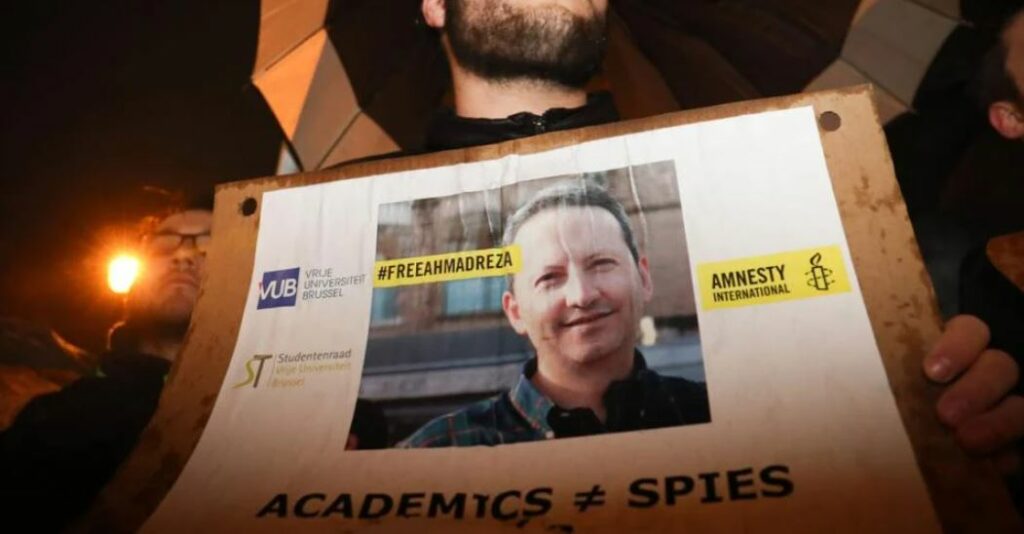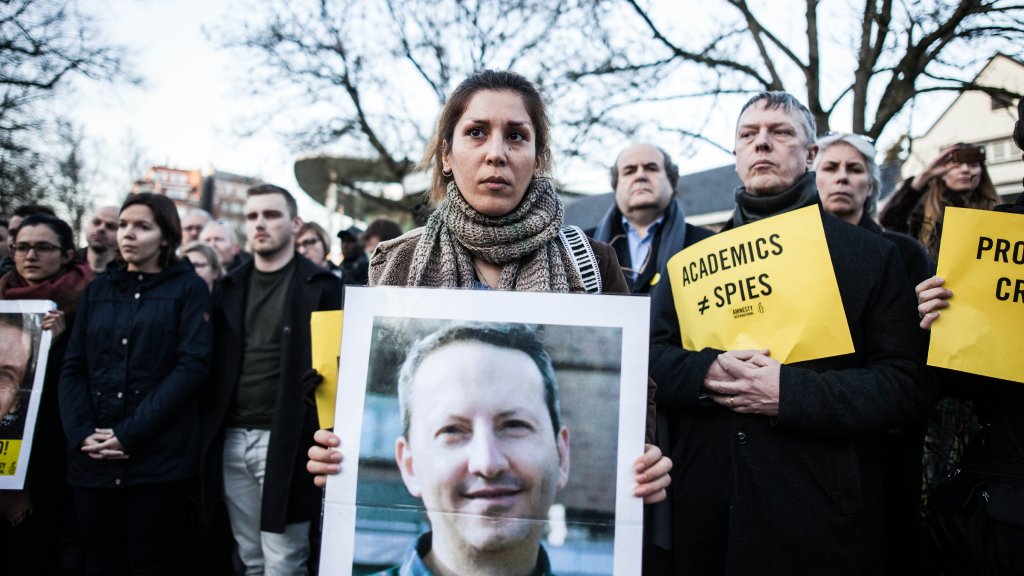The Iranian-Swedish professor Ahmadreza Djalali, the VUB guest lecturer who has been detained on false charges in Iran since 2016, will go on hunger strike again from Wednesday, his wife told French news agency AFP.
Djalali, a scientist and academic, has been imprisoned in Iran for more than eight years. He was arrested and charged with espionage during a working visit to the country in April 2016. He was sentenced to death a year later, but that execution has not been carried out.
"The only way to make my voice heard is to go on a hunger strike," said Djalali, according to his wife Vida Mehrannia. "As a doctor, Ahmadreza knows all too well that his fragile condition makes a hunger strike potentially fatal, but he sees no other way out," she told AFP.
"After nearly 3,000 days of suffering and unimaginable torment in Evin, Ahmadreza is in extremely poor health and at high risk of execution," she added. "Despite being so physically weak, he feels he has no other option but to go on a hunger strike."
After his two previous hunger strikes, Djalali suffers from cardiac arrhythmia, anaemia and extreme weight loss.
'Hard truth'
On 15 June, Swedish EU diplomat Johan Floderus (who lives in Brussels) and his compatriot Saeed Azizi were released by Iran. In exchange, Sweden released the Iranian Hamid Noury, who had been sentenced to life imprisonment in Sweden.
However, there was no deal for Djalali, after which he turned directly to the Swedish Prime Minister. The Swedish authorities emphasised that they did everything possible for his release, but the Iranian authorities refused to recognise Djalali's Swedish nationality.
"Our choice was to get Johan and Saeed released or to drop everything. It's the hard truth, and I fully respect the disappointment," Swedish Prime Minister Ulf Kristersson told Swedish public broadcaster SVT.
When Belgian Olivier Vandecasteele was released last year, Djalali was not part of the deal either. At the time, Belgium also freed three more innocent Europeans (two people from Austria and one from Denmark) from their cells in Iran.

Credit: Belga
For years, Amnesty International and the VUB have been calling for the fate of Djalali to be widely publicised to draw as much (international) attention as possible to the case. An Amnesty International petition to demand his release has already been signed more than 113,000 times in Belgium.
On Thursday, Amnesty International is organising a protest in front of the Swedish Consulate General in Brussels. They will demand concrete steps from Sweden to obtain Djalali's release and want to express their solidarity with him and his family.
The action's central message "Bring Djalali Home" will be reinforced with sidewalk chalk and a large banner, while posters and stickers will also be distributed to passers-by. Additionally, Djalali's message to the Swedish Prime Minister will also be played using a sound system.
'You left me here'
“In April 2016, Ahmadreza Djalali was arbitrarily detained. After eight years of immeasurable injustice, and now that the risk of execution is again very high, the Swedish Government must urgently make clear what steps it will take to free Dr Djalali and to ensure accountability for the crimes committed he became a victim of," said Wies De Graeve, director of Amnesty International Flanders.
He added that Amnesty International naturally shares the relief and joy of the families, friends and supporters of Swedish nationals Johan Floderus and Saeed Azizi, "but the news hit Dr. Djalali and his family very hard."
Djalali himself was able to respond to the Swedish deal last week with an audio message to the Swedish Prime Minister, in which he expressed his joy for the released compatriots, but he also said "you left me here."
Related News
- Belgium frees three more Europeans from Iranian cells
- Swedish Brussels resident and diplomat Floderus released by Iran in prison exchange
- Swedish-Iranian researcher faces imminent execution in Iran on trumped-up charges
"Dr. Djalali's heartbreaking message highlights how the Swedish authorities – and by extension the EU and other states – are failing to provide a robust response to Iran's hostage policy," De Graeve said. "Additionally, there is an ongoing wave of executions going on in Iran. The risk of Djalali being executed is very real. The Swedish Government must therefore urgently adjust its sails."
Additionally, Amnesty calls for action to put an end to Iran's hostage policy and to release other arbitrarily detained people with foreign or dual nationality.
The organisation is also calling for an investigation into international crimes committed by the Iranian authorities, De Graeve said, for crimes "such as torture, hostage-taking and enforced disappearance."

